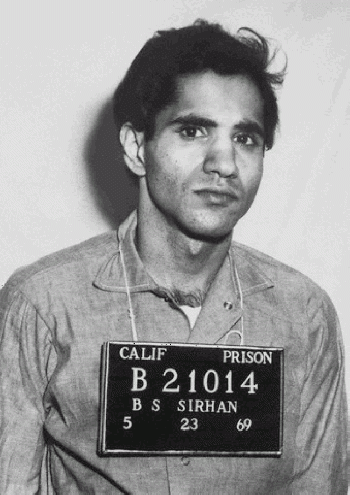
Sirhan Sirhan
(Image by (From Wikimedia) California Department of Corrections, Author: California Department of Corrections) Details Source DMCA
At Sirhan's first trial, Pepper said, the evidence was "weak, bad, and unjust." The goal was to save his life, not "to free a guilty man." California's ballistics evidence was accepted, rather than Pepper's finding that the bullet that killed Kennedy had not come from Sirhan's gun. This 50-year-old evidence, if accepted, would have imprisoned the 24-year-old Palestinian Christian for around twenty years. Instead, like James Earl Ray, Sirhan will die in prison without OAS intervention, said Pepper. Sirhan plans to return to Jordan if he is freed.
Sirhan had worked as a trainer at a mafia-controlled racetrack, where, according to Pepper, Sirhan was apparently inveigled into relationships that led him to the assassination scene as a patsy. Pepper's filing cites evidence based on 70 hours of Sirhan's interviews with Dr. Dan Brown, a Harvard University expert on brainwashing, concluding that Sirhan had fallen under mind-control through the use of drugs and hypnosis during two weeks prior to the assassination when Sirhan had disappeared from his family and friends.
*****
The filing relies also on other scientific evidence: the tape recording of the assassination, which occurred in the pantry of the Ambassador Hotel in Los Angeles, revealed that 13 bullets were fired. Sirhan was said to have fired eight of them. The lethal bullet hit Kennedy from the back, into his head, at "powder-burn range at a slightly upward angle"--as an autopsy revealed--rather than from the front five to six feet away, where Sirhan was located.
Deeper research revealed to Pepper that Sirhan had been led to the pantry by a woman "in a polka-dot dress." She pinched him and he then jumped up and fired twice, aiming at RFK's waistband. This reflex action betrayed robotic control. Sirhan himself has not remembered the details of the heinous act he was forced to perform. He remembers the "woman in the polka-dot dress" and that he had alcoholic drinks with her before the assassination. He actually got off only two shots. After that the woman left the kitchen and gleefully proclaimed, "We shot him! We shot him!" Authorities have never reported her as found after that.
The petition argues that Sirhan failed to receive effective assistance of counsel at trial because his lawyer, the late Grant Cooper, was secretly under indictment and failed to provide an effective defense. Cooper conceded at the outset to the jury that his client was guilty; SIrhan's attorney failed to challenge the government's evidence on vulnerable points for the most part, the petition said.
At a parole hearing in February 2016, Paul Schrade, an executive from the United Auto Workers and progressive who worked closely with RFK during the presidential campaign, who had been hit by two bullets, begged to reopen the investigation--he had this right to speak, as another victim that awful day in June 1968. Angered by the indifferent response, Schrade is to this day still attempting to get the trial. This parole hearing was largely closed to the public except for a pool reporter from the Associated Press, a strange development for such an iconic case in an "open" society.
*****
Pepper said his research on the unjust treatment of accused killers in the King and Sirhan cases repeatedly showed that family members, witnesses, and reporters fear reprisal for speaking out.
Summing up, it is the conclusion of this editor that the Democratic Party's ineffectiveness doubtless stems in significant part from the 1960s assassination of three of the greatest progressive leaders of the past five decades.
Have there been since the sixties any heroes to rival the two Kennedys and MLK? No. Among the many other worthies, none has posed the threat to the status quo comparable to these towering figures. We may legitimately fear that history teaches that if such a leader appears again, he/she will require not only our protection but God's.
And so, ultimately, many pivotal moments of both triumph and tragedy have been censored out of "history"--glaring omissions that scholars like Howard Zinn, Harvey Wasserman, Greg Palast, and other magisterial iconoclasts have fought against. "History repeats itself," warned the first journalist in history, Thucydides. Millennia later, the philosopher Friedrich Nietzsche added:
"Without an understanding of the past, we will never understand the present. And without understanding the present, we will never understand the past."
(Note: You can view every article as one long page if you sign up as an Advocate Member, or higher).






